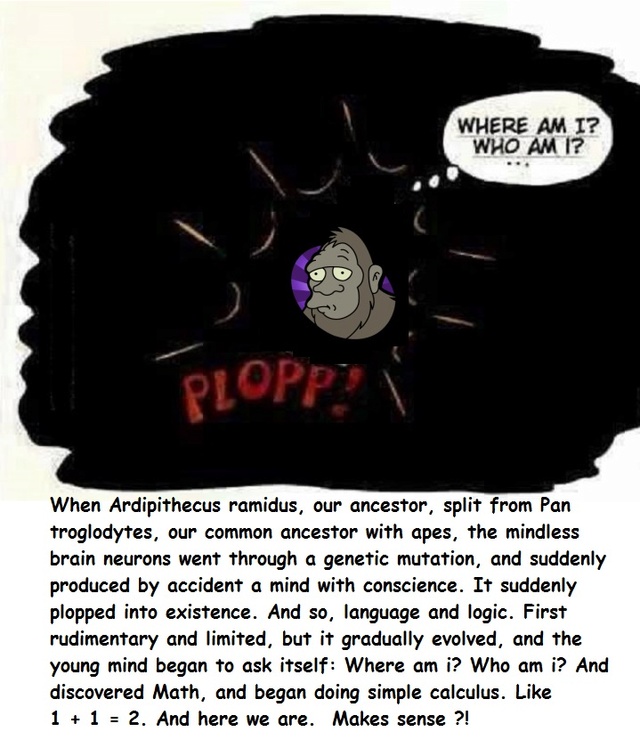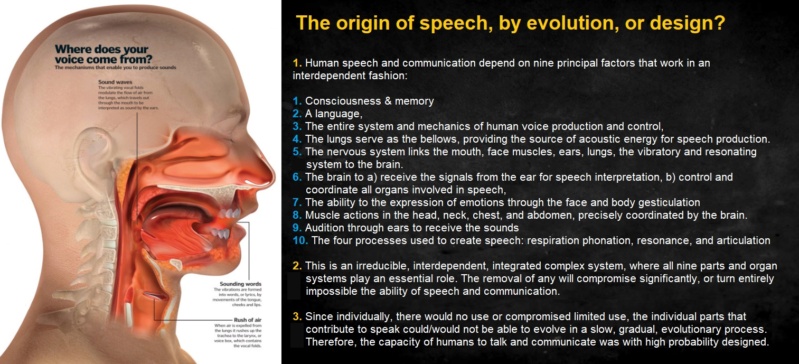https://reasonandscience.catsboard.com/t1334-the-origin-of-language#6045
How is it that matter-created minds start to think and comprehend math and calculus, and language, using the laws of logic, also in abstract ways, recognizing beauty, and solving problems? Perception, understanding, and evaluation of things adds a quality beyond and absent from natural physical matter and states, and can, therefore, not be reduced to known physical principles.
1. Human minds using objective logic exist. Logic is changeless and static. It is a law, upon which valid thought and communication depend (The Law of identity, the law of non-contradiction, and the Law of the excluded middle) Only a mind, conscious, able to use language and communicate, is able to recognize and use logic.
2. These laws exist and are true, independently of if a physical universe exists, or not. Neither can their origin depend on an evolving and changing universe, otherwise, they would also be subject to change. If thought and Logic come from proteins, chemicals, and neurons, then laws of logic would be different for everybody since no one has the same chemical and neurological patterns. Cosmic, chemical or biological evolution is not able to create something which is substantially different: A mind, using logic. If you split the brain you don't split abstract thought. That is evidence of dualism.
3. The laws of logic are also not merely human conventions. As W.L.Craig puts it: Any attempt to take the laws of logic as just human inventions is bound to assume the laws of logic themselves and so to be self-defeating.
4. The only plausible explanation for the existence of human minds using logic is that there is an uncreated, pre-existing eternal mind, capable of using language, communication, and objective logic, which created the physical universe, and contingent humans with minds using logic, created upon God's image.
1. Logic and its laws are absolute, conceptual truths and do not require the existence of the universe. Without laws of logic, we could not make an argument. We can make an argument. Therefore, there must be laws of logic.
2. All Communications require: The speaker's intentionality who sends a Message, sentences, and the recipient of the message The process of decoding, sorting and analyzing information, and language (sentences, words, letters) takes place. Logical processing, establishing the Truth, storing information or conclusion.
3. Any language or mathematical expression or communication is impossible without the Laws of Logic: Law of identity: A = A. The law of non-contradiction A is not B. The Law of Causality in Communication: Speaker, Sentence (Message), and Listener (receiver)
4. Conclusion: No one can deny the necessity of Logic, derived from the existence of God, the Eternal Mind, and none of us can communicate rationally using Logic while denying Logic.
To explain the origin of life, which then would produce consciousness, and then the comprehension that math drives the universe, and data life, and using advanced language and logic to describe those states of affairs, with matter as the starting point, as the origin of that directionality, is irrational to the extreme. A predating step is missing. Instructed specified values set the right forces and masses from the selection of an infinite set of possibilities, creating atoms, and upholding their stability through the laws of physics.
Robert T. Pennock (2001): "All historical, observational, testable, and repeatable examples PROVE information and operational functionality come from intelligent sources."
Life only comes from life. Consciousness, from consciousness. The ability to use language and logic, from genitors with the same ability. It has never been demonstrated otherwise. Therefore, it is rational to conclude that at the bottom of the chain, there is a rational agent with volition, that set all in motion. The universe, the laws that govern it, the right forces and masses that make up atoms and matter, life, consciousness, language, the recognition of the laws of logic, and comprehension.
There is also no physical principle that should give us the notion that our lives have purpose, meaning, value, and that we ought to live following certain moral standards and behaviors. Molecules simply don't care about such things. Then why should we, if we are the product of molecular accidents, and swirling electrons?
Flowering plants of the genus Musa will always only generate Bananas. Citrus species will always only produce citrus fruits like Orange, lemon etc.
Only an intelligent mind, capable of logical reasoning, is an adequate cause to create other minds able to reason. If we as humans possess the capability to intellectually understand and to know, then the cause must have the same or better capabilities of the same sort.
Arguing that matter can produce a mind, consciousness, intelligence, and the capability of logical reasoning is special pleading.
Logic exists in the realm of the mind. It is not made of physical stuff. It is transcendental, universal, and invariant, and based on axiomatic rules. Rational discourse and valid thoughts succeed only when logic is applied. Logic is the basis of thought and interrelated with conscience. How could non-reason produce reason? Non-logic produce logic? How can we know that the law of contradiction is true? that a lie cannot be true? Math and abstract numbers which do not stand in a cause-effect relation exist in the realm of the immaterial. How can the mind develop knowledge about these things? How could it evolve and create the ability to learning about numbers and calculus? How could it even begin to understand that one stone could be mathematically added up to a second one, resulting in two stones? For us, this is obvious and easy. But for an ignorant, recently emerging mind without experience and knowledge, only self-awareness?
In order for our reasoning process to be trustworthy and valid, it would have to be the result of a rational creation process of the creator of man. If apples cannot produce bananas, how could unanimated matter produce logic and that reason discover physical truths which involve complex math and metaphysical truths which are essentially non-materialistic? Naturalism is like someone sitting on a branch of a tree and saw it off. Atheism is self-defeating. Atheists argue about being right based on a thinking process, which has no foundation or validness to be trustworthy if its origin is not rational.
Only the believer in a rational God, which is the ultimate source of rationality and intelligence, and created humans in his likeliness, equipped with the same ability of reason, logic, sound thinking process and able to reach metaphysical truths can trust his mind, because he believes to be the result of a higher mind, which has all these faculties in a perfect, superior manner.
When did supposedly the mind start to recognize its self-existence? When did matter become conscient, and starting to think? Our sensory organs receive information and transmit them to the brain, where it is somehow perceived by the mind. How could the mind have processed its surrounding and make sense of it without the physical mechanisms in place? How is physical sensory information transformed in perception of the mind and understanding? How could a conscient mind transition to a thinking process without the existence of language? Further, in order for communication between two individuals to begin to exist, there had to be a common assignment of meaning and common understanding of words and their meaning. How could that agreement be formed and be done without a pre-existing language to come to that common agreement? Agreements require pre-existing language based on pre-existing agreement of meaning of words. How language could have gotten " off the hook" by natural evolutionary means is hard to fathom. Actually, I think we can reasonably say, it's not possible. Einstein describes this as an unbridgeable Gulf, that cannot be crossed. Great minds like Planck did hold that the mind precedes matter. Evidence points to that scenario.
As Dembski wrote: Provided the proposition, together with its competitors, form a mutually exclusive and exhaustive class, eliminating all the competitors entails that the proposition is true. As Sherlock Holmes famous dictum says: when you have eliminated the impossible, whatever remains, however improbable, must be the truth. This is the ideal case, in which eliminative inductions, in fact, become deductions. The problem is that in practice we don't have a neat ordering of competitors that can then all be knocked down with a few straightforward and judicious blows.
There is nothing ridiculous to believe in the Genesis account. God created man and woman fully formed, and the tower of Babel made God have some fun.....
Chomsky insists that
"mid-century studies based on the evolution of language from apes to humans only “bring out more clearly the extent to which human language appears to be a unique phenomenon, without significant analogue in the animal world."
Without laws of logic, we could not make an argument.
We can make an argument.
Therefore, there must be laws of logic.
While this argument is circular, it is a non-fallacious use of circular reasoning. Since we couldn’t prove anything apart from the laws of logic, we must presuppose the laws of logic even to prove they exist. In fact, if someone were trying to disprove that laws of logic exist, he’d have to use the laws of logic in his attempt, thereby refuting himself. Your non-Christian friend must agree there are certain standards that can be proven with circular reasoning.
The basic presupposition—God exists and has revealed Himself in His inerrant, authoritative Word—is the ultimate standard. Presupposing God exists to argue that God exists is a reasonable circular argument because without the God of the Bible, we have no basis for assuming the laws of logic and their properties, let alone absolute morality or the uniformity of nature.
Human Language: The Homo Homolog
https://reasonandscience.catsboard.com/t1334-the-origin-of-language
Different regions of the cortex are responsible for different brain functions. The division is not precise — there is some overlap — but the cortex is often divided into four lobes , each lobe having a distinct functional responsibility.
Language and logic use very different set of activations in the brain. 1
Comparison of inference and grammar trials for logic arguments isolated a different network than the one uncovered by the same comparison performed on linguistic arguments. Inference on linguistic arguments activated regions typically reported for linguistic processing tasks. On the other hand, logic inference did not recruit the latter areas but rather a network of regions highly similar to that reported in previous studies of deduction with sentential connectives and quantifiers.
The principal elements of human linguistic capacity are embodied by structures proximal to the left sylvian fissure. In contrast, logic inference (compared with its grammar baseline) produces no activation in the language areas. Logic inference is associated with the activation of regions that have been linked to goal/subgoal processing in tasks requiring multiple steps and embedded operations.
There are overlapping network regions associated with increased cognitive load, working memory, and executive processes. The role of language in logic is limited to decoding arguments into a format suitable for inference and then encoding the result of inference back into language.


When Ardipithecus ramidus, our ancestor, split from Pan troglodytes, our common ancestor with apes, the mindless brain neurons went through a genetic mutation, and suddenly produced by accident a mind with conscience. It suddenly plopped into existence. And so, language and logic. First rudimentary and limited, but it gradually evolved, and the young mind began to ask itself: Where am i? Who am i? And discovered Math, and began doing simple calculus. Like 1 + 1 = 2. And here we are. Makes sense ?!
1. https://www.ncbi.nlm.nih.gov/pmc/articles/PMC2718391/
Last edited by Otangelo on Fri Jul 22, 2022 9:08 am; edited 22 times in total











